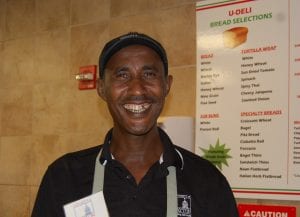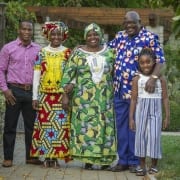Refugee Services
/in Assists Children, Programs & Services, Refugee Resettlement, Top Level Program Category /by atomicRefugee Services
Among Catholic Social Services’ programs, refugee resettlement has the most dramatic and immediate impact on the lives of those served. With remarkable strength and perseverance, these men, women and children have fled their homes to undertake the long journey to escape persecution, war and violence. On average, refugees wait 10 years before they are relocated to a new country. They are met at the airport after an exhausting trip that may have spanned several continents. They often have little in the way of personal effects after years in refugee camps. They are strangers in a strange land, but they have hope for a new, better life.
Official refugee status is conferred through the United Nations High Commissioner for Refugees (UNHCR), and is just one of many steps in a long and complex process. By the time refugees arrived in Dayton, Ohio, they had been through a rigorous vetting process that typically takes 18 to 24 months.
Frequently Asked Questions
What’s the difference between an immigrant and a refugee?
Refugees are people forced to flee their own country and seek safety in another country. They are unable to return to their own country because of feared persecution as a result of who they are, what they believe in or say, or because of armed conflict, violence or serious public disorder. Many have been forced to flee with little more than the clothes on their back, leaving behind their homes, possessions, jobs and loved ones. They may have suffered human rights violations, been injured in their flight, or seen family members or friends killed or attacked. The United Nations and the United States allow refugees to have protected status. The U.S. permits them to be here through a special visa. They are then expected to get their green card within a year and apply for citizenship after five years.
Immigrants choose to move to another country, often for economic, social, or personal reasons, and are not forced to leave their home country due to persecution or conflict. Unlike refugees, immigrants are free to return to their home country if they choose to do so.
Are refugees undocumented immigrants?
No.
To be officially classified as a refugee, a person has to flee his or her native country and apply to the United Nations High Commissioner for Refugees (UNHCR) for protection and refugee status. There are many subsequent steps before a refugee ever gets to the United States, including extensive vetting by the U.S. government agencies.
By the time they get here, they have been through an 18-24 month screening process and are legally authorized to be resettled in this country. Refugees are subject to the highest level of security checks of any category of traveler to the United States.
Where did refugees living in Dayton come from?
In recent years, new arrivals resettling in Dayton have come from countries including:
- Democratic Republic of Congo
- Sudan
- Afghanistan
- Eritrea
- Venezuela
- Republic of South Sudan
- Iraq
- Iran
How can I help?
Thanks for asking!
If you are a local employer or landlord interested in working with us, please call (937) 223-7217 and ask for the Refugee Services department.
For information about our current volunteer and donation needs, please visit the You Can Help section of this website.
What does CSSMV do to help refugees in Dayton?
 For refugees, employment is a vital step toward achieving self-sufficiency. New arrivals are eager to build strong foundations for themselves and their families here in the Miami Valley.
For refugees, employment is a vital step toward achieving self-sufficiency. New arrivals are eager to build strong foundations for themselves and their families here in the Miami Valley.
Refugees are legally allowed to work immediately upon their arrival in the United States. Our refugee resettlement team works with each individual to assess their existing skills, help them with resumes and job applications, provide job readiness training, and help manage expectations.
We also work closely with local employers, to match job skills to the employers’ needs and help ensure a positive experience for the business as well as the new employee.
Our program boasts a high employment rate within the first year of resettlement. That means within about six to nine months, most people are entering their first job after coming to Dayton. And it takes about that much time — six months of English classes, six months of employment and job skills training. We also see many of the refugees taking the same paths that many American-born citizens do, seeking job upgrades after a year and attaining second employment.
If you are a Dayton-area employer who would like to learn more about hiring refugees, call (937) 223-7217 and ask to talk with a refugee employment specialist.
“Attracting capable, reliable workers is a significant challenge and we are thrilled that we have been able to support the refugee community while at the same time meeting the needs of Dayton’s employers.” — Tom Maher, President & CEO, Manpower of Dayton
Imagine being forced to leave your home and move to another country. You have little or no choice in choosing the country you’re going to, and you don’t know the language or what the culture is like. Your job skills may not be transferable to the local economy where you’re going. Even the food is completely foreign to you.
Many of our new arrivals are multi-lingual, but English may not be one of the languages they know. And some are illiterate, even in their primary languages. Linking refugees with ESOL classes (English for Speakers of Other Languages) is one of our first steps when needed.
While each person’s needs are unique, there are key types of community resources that are beneficial to most of the individuals and families we serve. Our refugee resettlement team has worked diligently to build great relationships with local partners and help them understand how to best serve this vulnerable population. Our case managers connect their clients directly with the appropriate community resources to assist with things like:
- Medical care and establishing a medical home
- Mental health and trauma counseling
- Job skills training
- Tutoring for children and adults
- School enrollment
- Case planning for self-sufficiency
UNHCR, the United Nations’ refugee agency, tracks data about refugees and other displaced people worldwide.
Eligibility
Refugees being served by CSSMV were resettled in our community after going through an extensive process including review by the United Nations High Commissioner for Refugees (UNHCR) and the U.S. State Department.
Contact
For information about our refugee services program, call (937) 223-7217.
Location
CSSMV Refugee Services
Center for Families
1046 Brown Street
Dayton, Ohio 45409

Eckerle Administration Center
922 West Riverview Avenue
Dayton, OH 45402
(937) 223-7217 or (800) 300-2937
General email: cssmv@cssmv.org
Navigation
Latest News
- CEO LAURA ROESCH TO STEP DOWN AFTER 16 YEARS OF LEADERSHIPDecember 15, 2025 - 10:09 am
Press Release CATHOLIC SOCIAL SERVICES OF THE MIAMI VALLEY ANNOUNCES CEO LAURA ROESCH TO STEP DOWN AFTER 16 YEARS OF LEADERSHIP DAYTON, OH – December 15, 2025 – A well-known community leader is transitioning to a new role. Laura J. Roesch has announced her resignation from her position as Chief Executive Officer of Catholic Social […]


